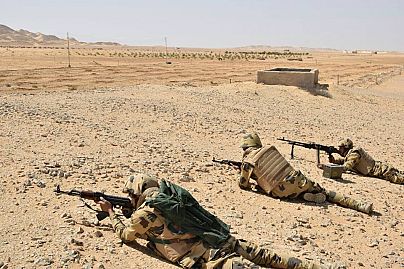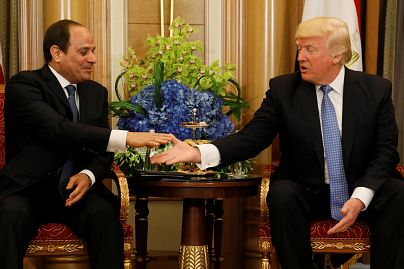Euronews spoke to experts about what Sisi has done during his first four years in power and what another term in office could mean for Egypt.
Egypt is voting this week in a presidential election that looks set to deliver an easy win for incumbent Abdel Fattah al-Sisi, bringing him a second four-year term in office.
 ADVERTISEMENT
ADVERTISEMENT
 ADVERTISEMENT
ADVERTISEMENT
The former general led the military’s overthrow of Egypt’s first democratically elected president, Mohamed Morsi, in 2013.
Since being sworn into office, Sisi, 63, says he has brought stability and security to a country rocked by unrest.
Critics, however, have dubbed this week’s vote a charade, pointing to the withdrawal of several candidates, leaving only longtime Sisi supporter Moussa Mostafa Moussa in the running.
Turnout for the vote has been described by several observers as the most credible gauge of his popularity.
But what has Sisi done with his first four years in office, and what could we expect from another term?
Opposition
Jan Claudius Völkel, a researcher at the Institute for European Studies who specialises in Middle Eastern politics, said people in Egypt "do not dare speak out on any political oppositional views anymore."
Human Rights Watch says that under Sisi’s rule, Egyptian police and security agents have used torture and enforced disappearances against “perceived political opponents” with near impunity.
Public criticism of the government is “effectively banned,” according to the NGO.
Local rights groups estimate that there are around 60,000 political prisoners in the country.
Samer Shehata, a professor of Middle Eastern politics at the University of Oklahoma, said politics in Egypt is "more repressive and authoritarian today than it was at any time under Hosni Mubarak."
"Today's elections are even less competitive than the non-competitive presidential elections in 2005, in which Mubarak 'competed' against nine other candidates, including firebrand and well known opposition politician Ayman Nour," he explained.
Several opposition figures called for a boycott of this week’s vote after all serious challengers were forced to halt campaigns or withdraw, citing intimidation.
Security
Völkel said security is one of two key areas Sisi has focused on during his four-year rule.
Sisi has pledged to use “brute force” against an ISIS-affiliated insurgency in Egypt’s Sinai Peninsula.
His supporters argue that the security situation has improved as a result of his tactics, but years of military action in the Sinai have not stopped attacks.
In November 2017, militants killed more than 300 people at a mosque in the Sinai in the deadliest attack of its kind since the Islamist insurgency in the peninsula was stepped up in 2013.
“Security has not remarkably improved — we still have attacks, even in Cairo,” Völkel told Euronews.
Economy
According to Völkel, the other key focus of Sisi’s rule has been economic development.
“The government is keen to focus on their big bang projects, for instance the enlargement of the Suez canal or the initiation of a new administrative capital east of Cairo, so these are the things where the government claims to have been very successful,” he said.
In addition to these projects, the International Monetary Fund (IMF) approved a three-year $12 billion bailout programme for Egypt in 2016.
In order to secure the loan Egypt devalued its currency by 48%, leaving most people worse off in austerity measures that sought to improve the economy in the long term.
Sisi says marked improvements have already been seen, with foreign reserves in July 2017 at $35 billion, or around where the country was before the 2011 uprising drove tourists and foreign investors away.
Völkel, however, argued that economically, the country remains in decline, with growing poverty, ongoing unemployment, and a lack of opportunities.
“There is this gap between what the government describes and what the reality for most Egyptians looks like,” he said.
Shehata said the economy "is not particularly strong with tourism revenues down, inflation at almost record highs, [and] the Egyptian pound incredibly weakened as a result of a massive devaluation."
Observers say a low turnout could suggest Sisi lacks the mandate to take more tough steps to revive the economy.
Foreign affairs
US President Donald Trump welcomed Sisi to the White House in April 2017 and said he was doing a “fantastic job.”
On the same month, Sisi also received a royal welcome in Saudi Arabia.
In June of that year, Sisi ratified a controversial treaty, transferring two largely uninhabited Red Sea islands to Saudi Arabia.
The move sparked protests in Egypt, where the president was accused of “selling” territory for aid. Security forces cracked down on the demonstrations.
In summer 2017 Egypt joined a Saudi-led boycott of Qatar, accusing the small Gulf state of enabling terrorism and trying to destabilise the region before expelling its diplomats. Egypt sees Qatar as a threat to its stability over the latter's support of the Muslim Brotherhood, which Sisi has declared a terror organisation.
In December 2017, Egypt and Russia signed a contract for the building of Egypt’s first nuclear power plant during a visit to Cairo by President Vladimir Putin.
Human rights
Shehata argued that there "are more restrictions on civil society" now than there were under Mubarak.
Human Rights Watch says prosecutions, travel bans and asset freezes against human rights activists “threaten to effectively eradicate independent civil society” in Egypt.
The group says Sisi’s government also denies workers the right to unionise.
Under Sisi women have continued to be subjected to sexual violence; asylum seekers and refugees have faced arrest, detention and deportation; and Christians have been discriminated against, according to Amnesty International.
Völkel described the human rights situation as being in a “disastrous state.”
Style of rule
Völkel said Sisi’s style of ruling over the past four years has highlighted differences between the man who speaks in a “very soft voice” during political speeches and the “hardcore dictatorial leader” who stamps out any voices of dissent.
“There are at least these two extreme different faces that Sisi has in his leadership style,” he said.
Shehata said Sisi's style of rule in his first term has been "thoroughly authoritarian."
"Sisi is an extremely divisive character and his supporters — and there are many — would claim that he has brought some stability to Egypt and 'saved' Egypt from political and institutional disintegration after the chaotic period following the 2011 'revolution.' I don't agree with this assessment but many of his supporters would make such claims," he said.
What next?
In a new term in office, Shehata said people could expect "more of the same" from Sisi, while efforts may be seen to increase his rule even further.
"There is no indication that the political situation will improve and in fact, some troubling indications that Sisi and his supporters might attempt to amend the constitution to allow him to remain in power longer than a second term," he said.
"There have already been efforts to change the presidential term from four to six years and there is also talk of amending the restriction on presidential term limits in the future to allow him to remain in office after 2022."
Going forward, Völkel agreed that if all external conditions remain the same, Sisi’s rule will continue along the same path.
However, he noted that political decisions by Saudi Arabia during Sisi's next term could have a major impact on Egypt, which relies on the Middle Eastern kingdom both politically and economically.












